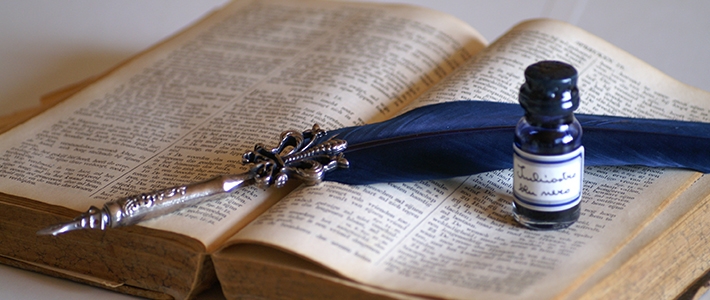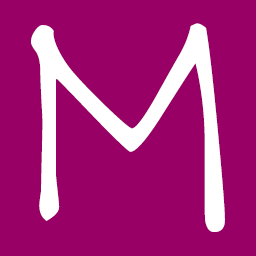In a diversion from my usual entries, I have been invited to join the 'Blog Tour', which I've found surprisingly helpful in making me think about my own interests and priorities for my future writing. The idea is that you answer a few questions about your writing process then pass onto some fellow bloggers to do the same.
I have been handed the baton by poet and avid traveller Katie Hale, who goes by the blogging alias 'Second-Hand Hedgehog'. Katie has also just completed her MLitt in Creative Writing at St Andrews and recently returned home to the Lake District where she runs 'New Writing Cumbria'. She founded guerrilla poetry organisation [insert text here] in February 2012.
1) What am I working on?
I started two large writing projects while studying for my MLitt (Creative Writing) in St Andrews, and since then they've been competing for attention during my writing time.
The first is a modernisation of the Welsh tales of the Mabinogion (roughly translates as 'Tales of childhood'). There are interesting thematic links between the stories and the characters in the collection of medieval tales, and so I wanted to pull these threads together and have characters interact in new ways by making my adaptation a novel rather than a collection of short stories. Setting it in the modern day also has its challenges, especially since I hoped to 'rationalise' the magic that pervades the original tales. The tales are full of bizarre behaviours and unexplained occurrences. I tried to find the cynical-of-magic, 'modern-day' equivalent of disappearing babies and girls turning into plants, often turning to science to explain the myth. This proved to be a greater challenge than I originally expected, and such changes had repercussions for the plot. And unsurprisingly, the only apparently non-science fiction project I have begun in recent years is slowly starting to whiff of science fiction...
My second project manifests itself more in concept than on paper, unfortunately. I'd like to write a collection of short stories about the effect of technology on the human mind, but only three of these so far have a concrete plot worked out. The other stories are forming themselves in my head, but trying to represent something as intangible as the internet or thought processes has been interesting, to say the least. The challenge has been in producing something that illustrates what I'm trying to say, rather than simply stating it in a way that would come across as too academic. This is one of the few pieces I've decided on a title for even before the writing is finished: 'Digital Tombstones'. (Google that phrase - creepy...)
However, while these two are stewing away, I have been focusing on setting up my blog and producing a new post (almost) every week. If you haven't yet encountered my regular blog, it's titled 'Novel Ideas.' I focus on recent developments in science, then look at examples from literature that have either predicted their arrival, or that have explored their implications.
2) How does my work differ from others of its genre?
Though I never usually write with the intention of writing in any particular genre, I tend to produce work that could fall under the label of science fiction, or speculative fiction. I don't see my writing as falling traditionally into the category of genre SF and I wouldn't want to mislead anyone searching for multi-limbed aliens, spaceships and phasers set to stun. There are vast swathes of fiction that benefit from having a sort-of genre ambiguity and this can really add to the impact of the novel.
Without meaning to, I have noticed that my work always ends up focusing around a similar set of themes. I'm fascinated by fantasy and myth, and as is evident in my blog, am always searching for scientific explanations for these. I'm interested on the impact of science on society and individuals.
As I have explained elsewhere on my blog, I think literature is a useful tool for exploring the future of science before it is put into practice. In the future, the technologically-advanced human race may look back on us and either laugh at our ignorance, praise our ability to foresee and avoid disaster, or lament our inability to avoid it.
3) Why do I write what I do?
My parents have undoubtedly had an influence in my interests. My mother insisted that A-level science should be an essential part of my education, regardless of whether I wanted to study science at university. I'm very grateful for this because when I experience something beautiful or poetic, I also have the scientific explanation come to mind. When I see clouds, I see formations of bitterly cold water droplets suspended in the troposphere. It doesn't take away the magic, it just adds a different kind of magic. Science also lends its own vocabulary, which has a poetry of its own.
I grew up reading fantasy, Tolkien in particular was a huge influence in my teenage years. I always wished that somehow these fantasy worlds, complete with their mythical creatures, spectacular landscapes and myriad of races, would prove themselves to be real. My reading influences have included many writers who could be said to write speculative or science fiction. Jules Verne's adventures around the world and to the centre of the earth instilled me with the sense that there was always more to explore, that there would always be something wonderful to see within the reach of our capabilities, if only we knew where to look.
World-creation like Tolkien's is a very difficult thing to achieve, but it is so gripping an satisfying for readers to escape to a world that is so rich in detail and realism that they feel like it could exist. I'd like to be able to spark that sense of wonder in my readers and encourage a similar enthusiasm for exploration and knowledge-seeking.

Credit: Marjoleinthewitch / DeviantArt
4) How does your writing process work?
Unfortunately it bears little resemblance to the above image!
I usually write straight onto my laptop. However, I'm certainly not alone as a writer who is rarely without a large and messy notebook in which I scribble down anything that may gestate and give birth to a story. I'm completely indiscriminate in my scribbling, which does cause its own problems, especially since my entries can be as short as a single word (identified as important with frantic underlining and an angry annotation) to something pages long and rambling.
However, whenever I'm looking for some inspiration, I have a rifle through the dog-eared tome and see if there's anything that might kick me out of the rut I've got myself stuck in. There's usually something, even if it means my character who's on the eve of her arranged marriage suddenly takes an unexpected detour into a genetics laboratory. Sometimes the mix of familiar and unfamiliar is enough to shake me out of the conventional way of thinking about the scene and can illuminate things about characters and plot I wouldn't otherwise have thought about.
When I need inspiration, I tend to pluck an idea from my large notebook of random ideas, take pen to paper and just write. I usually start with an image, a scene or a person and simply describe it until I build up momentum. There is usually a lot to be cut, but this method certainly feels very natural and productive.
My writing process largely depends on the type of writing I'm working on, but I have noticed recently that I do an inordinate amount of research. When starting projects in the past, especially those based heavily on world-creation, I have been known to fill entire A4 notebooks with research about relevant topics (global warming, cats, nuclear power stations), maps, detailed descriptions of race characteristics, sketches of characters and places. These notebooks have often become larger than the novel would be itself, and leave me with the daunting task of presenting it as something that a reader might be interested in. At least then I have a confident base from which to begin building the foundations of my story.
Next week will be business as usual, with a further entry to my Science and Literature blog 'Novel Ideas.' If you've enjoyed what you've read, please like my Facebook page. I'll be updating it regularly with lots more exciting articles about science and literature and where the two overlap. I'll also be sharing thoughts and articles which won't be appearing on this website, so make sure you like the page so you don't miss out on anything!
If you'd like to follow the blogging tour, three of my writer friends will be responding to these questions on Monday 3rd March:

Jessi Rich is a freelance writer based wherever the food is delicious and the rent cheap, currently Portland, Oregon. With a MLitt in Creative Writing from St Andrews, she is an aspiring author completing her first novel, a semi-accomplished playwright in the amateur theatre world, and a freshman blogger trying to be honest about the things she finds important: like birds, breasts, and the beauty of travelling alone. When not reading or writing she can be found wandering through the world with a flask in her satchel, a coffee in her hand, and a grin on her face.

Alyssa Kilzer recently graduated from the University of St Andrews with a Masters in Creative Writing. She's originally from Boston but in 2014 moved to Midland, Texas with her boyfriend. She is currently teaching yoga and writing short stories and life writing. Lately she is most interested in themes of the body and its surrounding environments. Her blog, is a new project with short at-home yoga sequences addressing different health issues and lifestyle needs. She is also literary writer and editor for theconnecticutreview.com.

Emma Lander is an aspiring author, a traveller when she has the funds, and an IT Support Analyst when she's saving for her next adventure. Originally from Wales, she is now currently based in Southern England. In more exciting news, she is working on a fantasy novel for children and saving for a trip to some place undecided. In 2012 she was selected in the top 10 Hot Keys and The Guardian Young Writer's Prize and has won a small selection of short story competitions, which has resulted in her work being published online and read aloud on Welsh radio. Emma has a degree in Creative Writing with Business Management. Her blog does not have a specific focus. Instead it is a place for her to scribble down thoughts, advice and information — anything that keeps the writing habit alive.
Listing image: secondlina / DeviantArt
